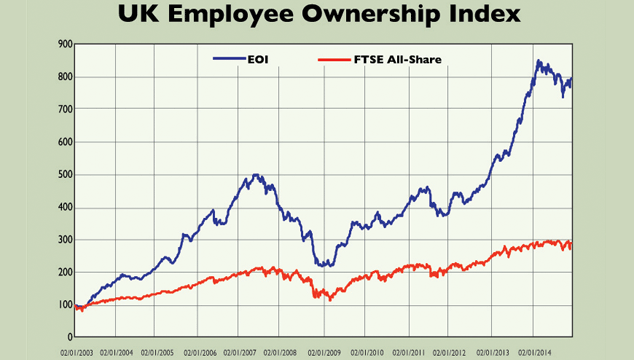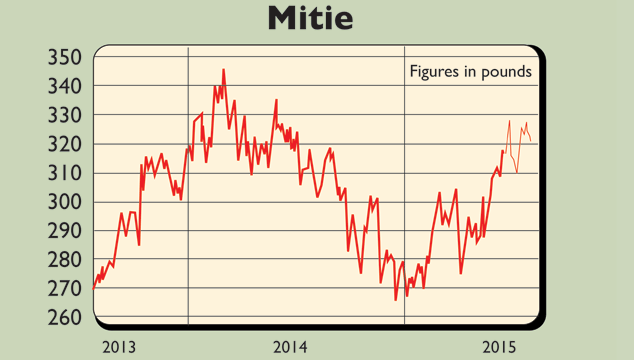Invest in worker-owned firms to boost your returns
Worker ownership may sound like a revolutionary idea. But actually it’s a good way to boost capitalism – and returns for investors, says David Thornton.
Get the latest financial news, insights and expert analysis from our award-winning MoneyWeek team, to help you understand what really matters when it comes to your finances.
You are now subscribed
Your newsletter sign-up was successful
Want to add more newsletters?

Twice daily
MoneyWeek
Get the latest financial news, insights and expert analysis from our award-winning MoneyWeek team, to help you understand what really matters when it comes to your finances.

Four times a week
Look After My Bills
Sign up to our free money-saving newsletter, filled with the latest news and expert advice to help you find the best tips and deals for managing your bills. Start saving today!

Corporate communications are awashwith clichs.A particularly hoary example appears at the bottom of nearly every chairman's statement I've ever read: "Our people are our greatest asset". It's often very clear that this polite nod to the workers is little more than window dressing.
But some companies do pay more than lip service to their staff in fact, they want workers to be owners too. The argument goes that staff who own shares are more motivated and engaged. And from the wider societal point of view, employee share ownership can encourage staff to embrace capitalism, rather than distrust it.
These days we're awash with buzz phrases, such as "corporate social responsibility" and "sustainable capitalism", so it's easy to be cynical about this as an investor. But you shouldn't be. A growing weight of evidence suggests there's a link between high levels of employee ownership and superior share-price performance.
MoneyWeek
Subscribe to MoneyWeek today and get your first six magazine issues absolutely FREE

Sign up to Money Morning
Don't miss the latest investment and personal finances news, market analysis, plus money-saving tips with our free twice-daily newsletter
Don't miss the latest investment and personal finances news, market analysis, plus money-saving tips with our free twice-daily newsletter
In fact, describing the outperformance as merely "superior" does it a disservice. To get an idea of how impressive it is, we have to turn to an obscure benchmark known as the Employee Ownership index (EOI). This tracks UK-listed stocks where staff own more than 3% of the company.
If you had invested £100 into the EOI when it launched in 2003, you'd have £749 now. That compares with just£277 from the All-Share index.That's an amazing 472% outperformance (see the chart below). Better still, it's been consistent the EOI beat the All-Share in nine of those 12 years. A version of the index dating back to 1992 is equally impressive. Nearly 25 years of data suggest that if staff own a meaningful slice of a company, it tends to mean more money for shareholders.

"Insider" share ownership is hardly a revolutionary idea. During my career as a fund manager, I always looked for high levels of director ownership before I bought a stock, and I'm far from the only one who likes to see directors with a good bit of skin in the game. It doesn't guarantee good management, but it's definitely a tick in the box. However, analysing board ownership is easy, because companies have to publish the data. But we're not talking about director ownership with the EOI.
Instead, these are companies where the staff outside of the boardroom own a big stake, and this information isn't as straightforward to extract. Nigel Mason of Capital Strategies, the man behind the EOI, told me it involves a great deal of digging around in company accounts and news releases. That might be a hassle, but from an investor's perspective the fact that these data are well hidden is good news an investment system has more chance of success if only a few people follow it (because otherwise it rapidly becomes "priced in" and stops working).
Let's take a look at the make-up of the EOI. Several hundred companies run "save as you earn" share schemes for staff. But far fewer take employee ownership seriously enough to have the staff, excluding board members, own 3% or more of the company. Mason's research shows that this magic 3% mark is the threshold above which strong shareholder returns kick in.
The EOI currently consists of around 70 stocks. That makes it a relatively select group, but also large enough to be a proper index. It is biased towards smaller companies, compared to the All-Share. Around 12 EOI members come from the FTSE 100, and about two-thirds are Aim or other small-cap shares. Financials have a relatively high weighting, because people-intensive firms, such as fund managers, brokers and insurers, often use share ownership and options to retain staff.
By contrast, capital-intensive firms, such as the major oil groups and miners, are underrepresented. This bias to small caps will have helped the EOI's investment returns over the long run (small caps tend to outperform over time). It also means that it does badly during bear markets; dropping by 44% in 2008, for example.
Yet the returns have been so good over time that they can't just be explained by a small-cap effect or sector bias. So why do companies with high levels of employee ownership do so well? Setting the bar at 3% of the company means the workers have more than just a handful of shares it's enough to make them feel and think like co-owners. This means they're likely to be well informed about the company's plans.
They're more likely to come up with new ideas and go the extra mile for customers. It also encourages them to hold management to account and to contribute to a dialogue. Put simply, as an investor, high employee ownership levels give us a way of identifying an intangible but key element of a quality company: a positive culture.
There's also another angle. We all know the pay gap between chief executives and employees has been growing. In 1998, the average CEO of a FTSE 100 company earned 47 times the pay of his underlings. Fifteen years later, this had almost trebled to 130 times. Inequality is a hot topic and something that politicians of all stripes want to address. I can't think of a better solution than employee share ownership. It helps ordinary staff build wealth of their own and be rewarded, rather than exploited, by capitalism.
Take the BT employee share scheme. One of the BT plans was launched near the bottom of the market in 2009. Around 22,000 workers invested. The average employee saved £8,000 over the five years of the scheme. On maturity, due to the low share price when the scheme launched, this bought them shares that were worth a whopping £49,000. It might not put them in "the 1%", but that's a life-changing sum for many people. It also created a feel-good buzz about the company and boosted staff interest in BT's financial performance.
Sadly, there isn't a fund based on the EOI yet, although Mason is working towards launching one. The constituents of the EOI aren't publicly available either, due to all the research that goes into identifying the stocks. However, I persuaded Mason to give me a peek at the current list and below I've cherry-picked five shares that I think are attractive plays on this theme.
The five stocks to buy now
Clothing chain Next (LSE: NXT) has been a stunning long-term outperformer (I've owned it for many years). It's a growth stock that also generates surplus cash, which it returns to shareholders through buybacks or special dividends.
With the share price currently above the company's buyback level, Next should pay close to 400p in total dividends this fiscal year, putting the shares on a tasty 5% yield. The price/earnings (p/e) ratio of more than 17 looks fairly full, but this reflects the fact that you're investing in a class act. Next epitomises the sort of high-quality company that the EOI measure helps to identify.
BT Group (LSE: BT.A) has also been a strong performer in recent years. Telecoms is a competitive industry, but BT has got itself onto the front foot. It has moved into premium content by acquiring sports rights, and is planning a full return to mobile via the takeover of EE.
BT still has a powerful market position and adding a "triple-play" of mobile, TV and fast broadband to its declining fixed-line business should underpin its growth prospects. Shares were given to its employees when it was privatised more than 30 years ago, meaning that BT has a long tradition of employee ownership. The shares yield 3% and are on a p/e of 15.
Mitie (LSE: MTO) is a natural for the EOI its unusual name stands for "management incentive through investment equity". Mitie takes stakes in outsourcing firms run by owner-managers. These co-owners then continue to grow their businesses under Mitie's wing. Profits have hit a bit of a plateau recently, following a good record of long-term growth.

However, a major restructuring process (which involved selling off businesses, including its asset management and electrical engineering units) has repositioned the company and the stock looks good value on a p/e of 13 and a yield of close to 4%.
Sports Direct (LSE: SPD) has a colourful image courtesy of its founder Mike Ashley. As a result, many people might doubt its credentials as a quality company but its excellent growth record suggests they'd be wrong. Sports Direct dominates the sports retail niche in the UK and is expanding in Europe.It operates a generous bonus share scheme for around 2,000 eligible employees, which has been a great staff motivator.The shares have consolidated over the last year, but look like they're on the move again. The p/e of 18 falls to 16 times next year's earnings, and there is no dividend payout.
Telford Homes (LSE: TEF) has been a great stock since the market bottomed in 2009, along with its fellow housebuilders. Telford builds in London, so it's certainly had the wind at its back in recent years. It operates in the mainstream rather than the prime property segment, with an average selling price under £500,000.
This month's annual general meeting confirmed that strong demand continues, so if you're a believer in a sustained housing cycle, Telford looks like a good play. The shares are on a p/e of ten and yield 3%. The trustees of the employee share scheme own 4% of the company.
David Thornton is a former fund manager with over 30 years' experience in the City.
Get the latest financial news, insights and expert analysis from our award-winning MoneyWeek team, to help you understand what really matters when it comes to your finances.
David Thornton is a small cap share expert with over 30 years’ experience in the investment world. He was an equity fund manager at Henderson Global Investors for 17 years, and in 2006 he launched the Matrix New Europe Fund, investing in equities throughout Eastern Europe, Russia and Turkey.
-
 Should you buy an active ETF?
Should you buy an active ETF?ETFs are often mischaracterised as passive products, but they can be a convenient way to add active management to your portfolio
-
 Power up your pension before 5 April – easy ways to save before the tax year end
Power up your pension before 5 April – easy ways to save before the tax year endWith the end of the tax year looming, pension savers currently have a window to review and maximise what’s going into their retirement funds – we look at how